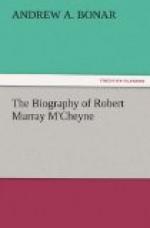At first light dawned slowly; so slowly, that for a considerable time he still relished an occasional plunge into scenes of gaiety. Even after entering the Divinity Hall, he could be persuaded to indulge in lighter pursuits, at least during the two first years of his attendance; but it was with growing alarm. When hurried away by such worldly joys, I find him writing thus:—“Sept. 14.—May there be few such records as this in my biography.” Then, “Dec. 9.—A thorn in my side—much torment.” As the unholiness of his pleasures became more apparent, he writes:—“March 10, 1832.—I hope never to play cards again.” “March 25.—Never visit on a Sunday evening again.” “April 10.—Absented myself from the dance; upbraidings ill to bear. But I must try to bear the cross.” It seems to be in reference to the receding tide, which thus for a season repeatedly drew him back to the world, that on July 8, 1836, he records: “This morning five years ago, my dear brother David died, and my heart for the first time knew true bereavement. Truly it was all well. Let me be dumb, for Thou didst it: and it was good for me that I was afflicted. I know not that any providence was ever more abused by man than that was by me; and yet, Lord, what mountains Thou comest over! none was ever more blessed to me.” To us who can look at the results, it appears probable that the Lord permitted him thus to try many broken cisterns, and to taste the wormwood of many earthly streams, in order that in after days, by the side of the fountain of living waters, he might point to the world he had forever left, and testify the surpassing preciousness of what he had now found.
Mr. Alexander Somerville (afterwards minister of Anderston Church, Glasgow) was his familiar friend and companion in the gay scenes of his youth. And he, too, about this time, having been brought to taste the powers of the world to come, they united their efforts for each other’s welfare. They met together for the study of the Bible, and used to exercise themselves in the Septuagint Greek and the Hebrew original. But oftener still they met for prayer and solemn converse; and carrying on all their studies in the same spirit, watched each other’s steps in the narrow way.
He thought himself much profited, at this period, by investigating the subject of Election and the Free Grace of God. But it was the reading of The Sum of Saving Knowledge, generally appended to our Confession of Faith, that brought him to a clear understanding of the way of acceptance with God. Those who are acquainted with its admirable statements of truth, will see how well fitted it was to direct an inquiring soul. I find him some years afterwards recording:—“March 11, 1834.—Read in the Sum of Saving Knowledge, the work which I think first of all wrought a saving change in me. How gladly would I renew the reading of it, if that change might be carried on to perfection!” It




